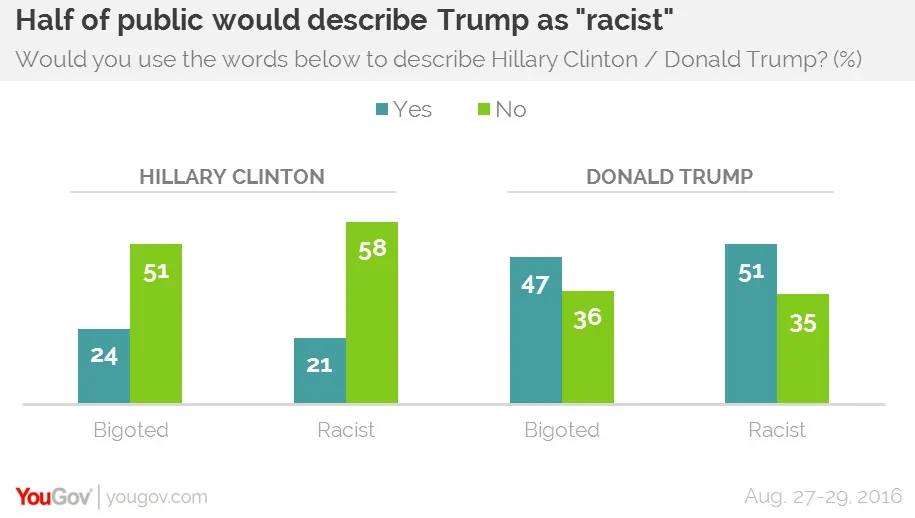Trump supporters continue to endorse a hard line on the GOP nominee's signature issue
Republican nominee Donald Trump makes his case on immigration tomorrow, but his supporters are very clear on what they believe. Trump also needs to clarify his own position: 57% of the country in the latest Economist/YouGov Poll believe he has been inconsistent on immigration policy. One in four of his own supporters agree.
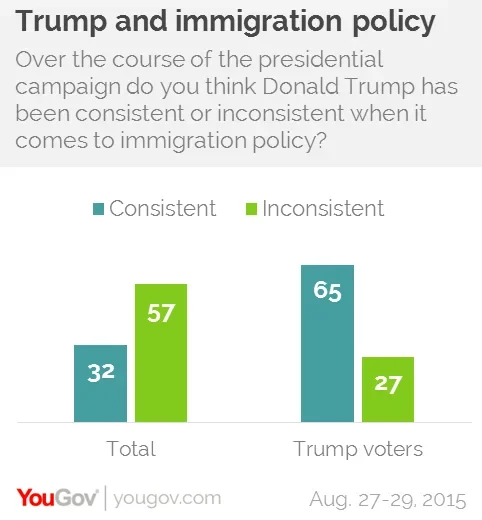
The New York businessman currently trails Democrat Hillary Clinton by five points, with a growing share of the electorate now sure they know how they will vote ten weeks from now, limiting the likelihood of gains from any “softening:” of Trump’s immigration position.
Clinton leads Trump 42% to 37% in a four-way contest that includes Libertarian Gary Johnson and Green Party candidate Jill Stein. The gap between the Democrat and the Republican remains five points, 47% to 42%, when those who favor other candidates, or aren’t sure what they plan to do, are asked their preference between the two.
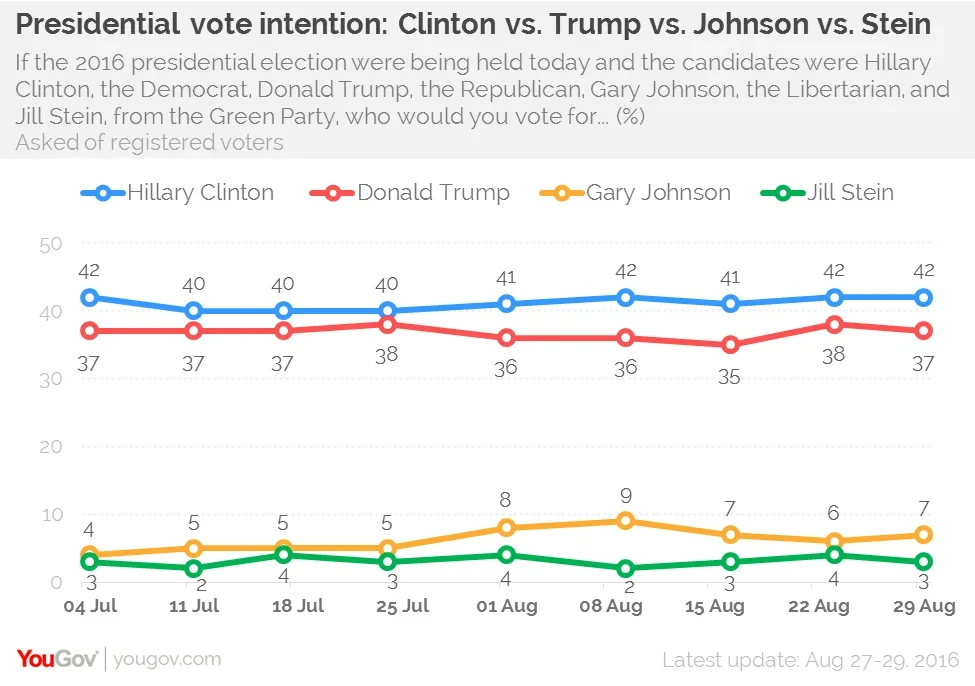
86% of registered voters claim they “have a good idea” who they will vote for – the highest percentage yet in Economist/YouGov Polls. They too favor Clinton – and by a similar five-point margin. Among those still making up their minds, 44% aren’t even sure they will definitely be voting in November.
Throughout the primary season, Trump’s supporters made it very clear where they stood on immigration: 82% of his voters in Economist/YouGov polls throughout the winter and spring said it was a very important issue. 73% of those supporting Trump in the general election – a broader group than his primary and caucus supporters – also do. And when it comes to immigration as an election issue, 77% of Trump voters say it is very important.
But for Republicans in general – and for the overall public – immigration appears less important. Among all Republicans, 57% describe immigration as a very important issue. That number is less than half among the public overall.
Trump can appeal to his supporters by taking a hard line on immigration – or he can soften his position to appeal more widely. Differences between those supporting Trump and other Americans are stark.
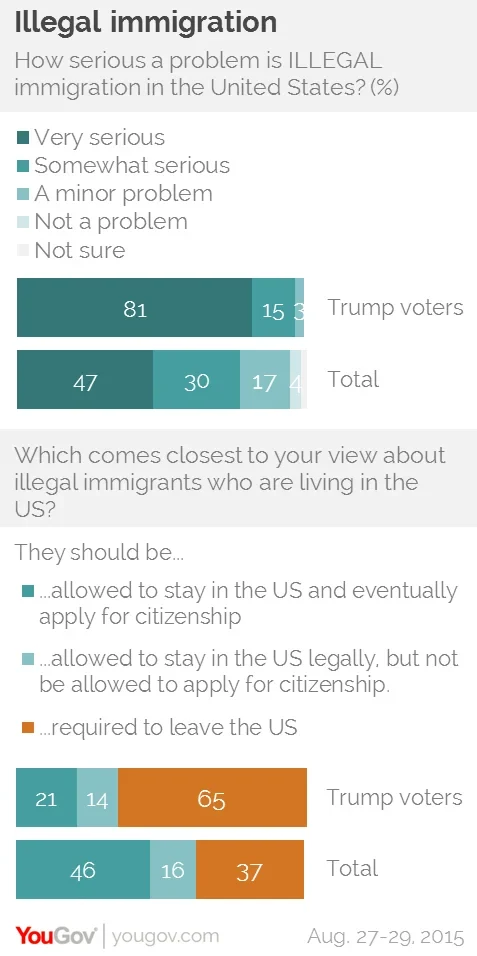
- 81% of Trump voters think illegal immigration is a very serious problem in the United States, though far fewer (27%) think it is a serious problem in their own communities. Less than half of registered voters see illegal immigration as very serious in the country.
- Two-thirds of Trump supporters want all illegal immigrants to leave the United States; most registered voters think they should stay, and nearly half support a path to citizenship.
Many Trump supporters may see a difference between their position and that of their candidate. 76% say Trump’s position includes a way back for illegal immigrants: that they must leave the United States but should be able to come back eventually if they fulfill certain requirements. Those not supporting Trump think Trump’s position as never allowing deported illegal immigrants to return at all.
Eight in ten Trump supporters, as they did in the primary, still agree with the statement he made on announcing his run for the presidency: “When Mexico sends its people, they’re not sending their best. They’re sending people that have lots of problems. They’re bringing drugs. They’re rapists.” Trump voters also want very strict law enforcement: nine in ten believe people should report employers who hire illegal immigrants, while government should increase the fines on those who do, criminalize the employment of illegals, and require police to report illegal immigrants to the federal government.
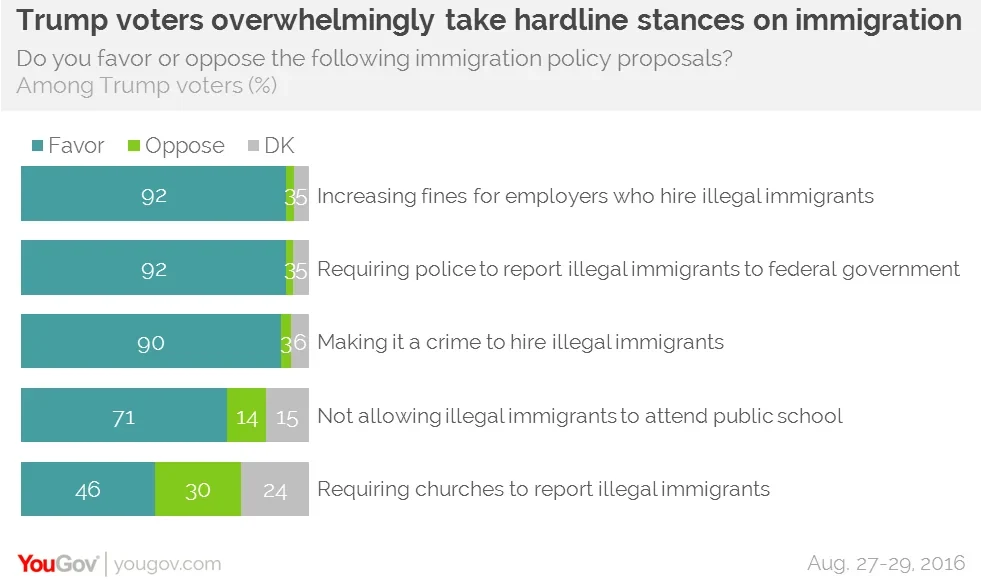
Seven in ten would keep children of illegal immigrants out of public schools, though half would give churches a pass: just 46% of Trump voters think churches should be required to report illegal immigrants. Overall, a majority of Americans support some of these measures, especially those regarding employers.
Perhaps no issue divides Trump supporters from others more clearly than support for a wall along the Mexican border. 82% of Trump voters favor this; only half that percentage of all registered voters do.
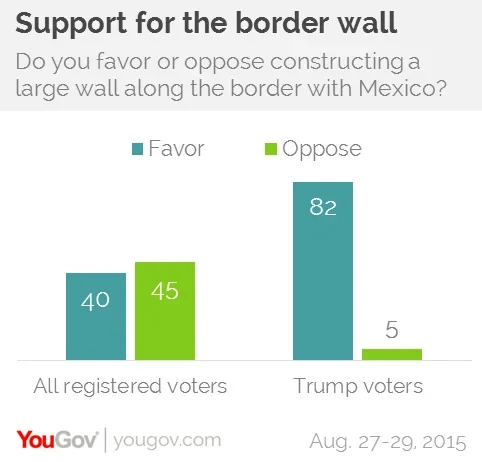
So Trump’s speech guidance – at least from his current supporters – would be to not soften his position on immigration. But there are other reasons to do so in order to appeal to more voters this fall.
First of all, there are lots of voters with a recent immigrant history, and they are not voting for Trump. Clinton holds a 15-point lead over Trump among the more than a third of voters who have at least one grandparents who was an immigrant. But the further from family immigrant status, the smaller the lead.
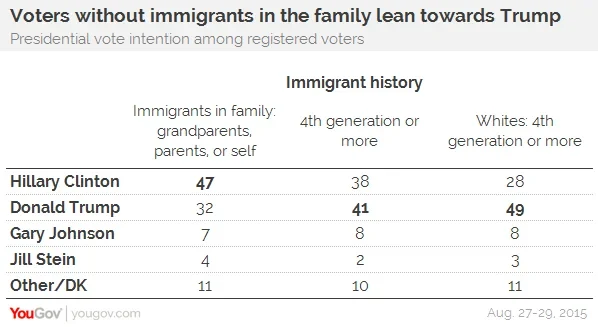
Clinton holds only a six-point lead among those with only an immigrant grandparent. Among those whose roots in the U.S. go back further, the race is close, with Trump narrowly ahead. But Clinton remains close among that group mostly because of her support from minorities (this week, 82% of African-Americans and 56% of Hispanics say they will vote for her). Among white voters whose grandparents were born in the United States, Trump leads Clinton by 21 points.
But another reason for Trump to soften his immigration stances is to soften his own image. Women continue to give Clinton a ten-point lead. The race is close among independents. And while 63% say he is tough, just 26% think he is compassionate.
Although Trump has tried to paint Clinton as racist, half the country say that label fits Trump instead (only 21% say that about Clinton, and most of that group are Trump voters). Results are similar in answer to whether “bigoted” describes each candidate.
